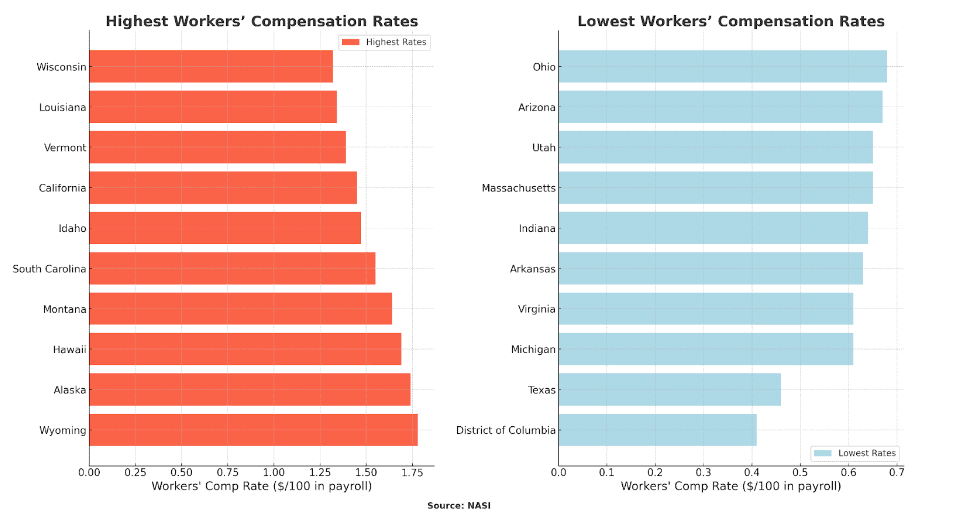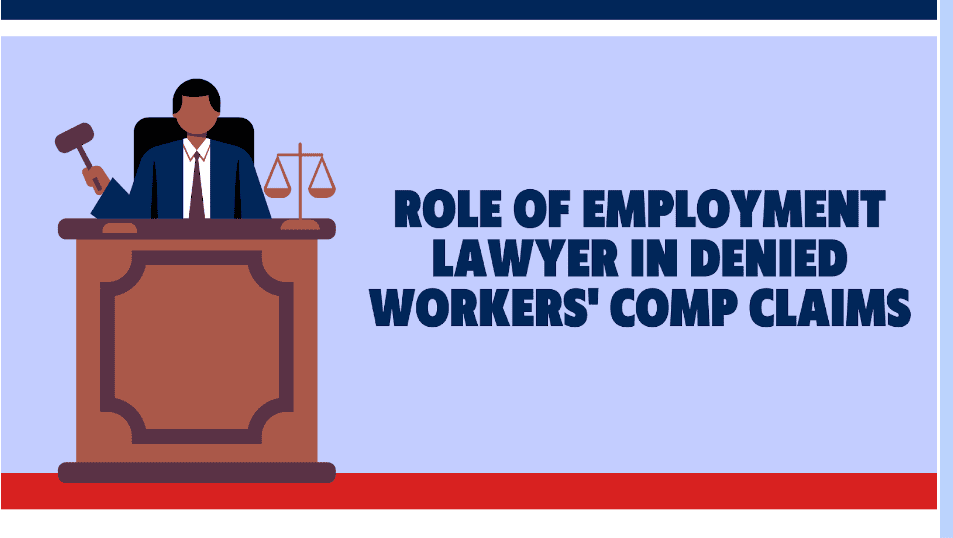Role of Employment Lawyer in Denied Workers’ Comp Claims
Has your workers’ comp claim been denied? You’re not alone. Around 7% of workers’ compensation claims get rejected initially. Dealing with medical bills and lost wages alone is tough.
In such dire circumstances, having a skilled employment lawyer for workers’ comp by your side can be the difference between securing the benefits you deserve and an uphill battle.
Why Claims Get Denied
Understanding the common reasons for workers’ comp claim denials can help you avoid potential pitfalls and strengthen your case.
| Reason for Denial | Examples |
| Non-work-related injury | Pre-existing conditions, injuries outside of work hours |
| Employer disputes claim | Arguing injury wasn’t job-related or happened during horseplay |
| Late reporting | Missing state deadlines for reporting injuries to employers |
| Incomplete documentation | Lacking medical records, inconsistent injury accounts, missing documents |
| Failure to seek medical care | Delaying treatment, raising doubts about injury severity |
| Injury not compensable | Stress claims can be harder to prove in some states |
| Discrepancies in reports | Contradictions between claim and medical evidence |
If your claim does get denied, don’t lose hope – you still have options through the appeals process.
The Appeals Process: A Lifeline
Here are the typical steps:
- Choose the Right Lawyer – The first step in the appeals process is to select an experienced employment lawyer. Your lawyer will be your advocate and guide through the complex legal terrain, so choosing someone with a track record of successfully handling appeals is crucial.
- Review the Denial Reason – Consult with your employment lawyer to thoroughly review and understand why your claim was denied. They can identify any errors or misunderstandings.
- File An Appeal – If the denial seems unjustified, your lawyer will guide you through filing an official appeal. In Ohio, you only have 14 days from the initial order, while in California, you file a Petition for Reconsideration or Removal.
- Hearing & Evidence – You’ll attend a hearing where your lawyer presents evidence and arguments in your favor. In Ohio, you receive written notice of the final decision after this hearing.
- Further Appeals – If your initial appeal is denied, there are often further avenues like appealing to a higher commission (Ohio) or appellate court (California’s Court of Appeal or Supreme Court).
- Persistence Pays Off – The appeals process can seem daunting, but having an experienced lawyer increases your chances of a successful outcome, as illustrated by real cases.
For instance, imagine if you’re from Los Angeles, where local laws and procedures add another layer of complexity. An experienced employment attorney in Los Angeles can be invaluable in navigating the appeals process. By following these steps and remaining steadfast in your pursuit of justice, you can navigate through the appeals process with confidence.
Skilled Representation at Hearings
When it comes to workers’ compensation hearings, having a skilled attorney can make all the difference. These hearings are a crucial part of the appeals process, and your lawyer can use their expertise to present evidence, question witnesses, and make compelling legal arguments on your behalf.
For example, in Ohio, a district hearing officer (DHO) presides over the first appeal hearing, which is held within 45 days of the request for a hearing. If you have hired an attorney, you do not need to attend the hearing or the second appeal hearing with the Industrial Commission (IC). The hearing usually lasts no longer than 15 minutes, and you and your lawyers present your strongest evidence.
At these hearings, injured workers are allowed to bring in witnesses to provide testimony related to the issue in dispute. They may also be able to compel a witness to testify in accordance with the IC’s subpoena power under ORC 4123.98. The hearing officers have access to your claim file and can access the database of medical documents and other evidence related to your claim.
Negotiating Fair Settlements
Even after a successful appeal, your journey may not be over. Insurance companies often try to negotiate a settlement offer. This is where having an experienced workers’ comp settlement negotiation attorney can be extremely valuable.
Your lawyer will carefully review all evidence and documentation to ensure it meets the appropriate standards for approval. They will also use their negotiation skills to secure a fair settlement that covers your medical expenses, lost wages, and any ongoing care or disability you may need.
Workers’ compensation rates can vary considerably across states, with some states having significantly higher or lower rates than others.

This chart highlights the states with the highest and lowest workers’ compensation rates based on the cost per $100 of payroll.
Taking Legal Action
In some cases, when negotiations reach a standstill or the appeals process fails to yield a favorable outcome, your employment lawyer for workers’ comp may recommend taking legal action in court.
While going to court should never be the first option, it may be necessary to secure the justice and compensation you deserve, especially in states like California, where you can take court action after exhausting administrative appeals.
In California, employers are required by law to carry workers’ compensation insurance. If an employer does not have workers’ compensation insurance, an injured worker can still take legal action against the employer in civil court. This can include damages for medical expenses, lost wages, and other compensable damages.
Overall, having a skilled workers’ compensation attorney by your side can greatly increase your chances of a successful outcome, whether through hearings, settlement negotiations, or legal action.
Protecting Your Rights
Throughout this arduous process, your employment lawyer serves as a guardian of your rights. They will ensure you are not retaliated against for filing a claim or appeal and that your employer respects your choices, such as selecting your preferred medical provider – a right often violated, leading to claim denials.
Furthermore, your lawyer will advocate for you if your employer pressures you to abandon your appeal or attempts to terminate your employment unlawfully, acting as a bulwark against any unethical practices.
Choosing the Right Employment Lawyer
The first step in successfully appealing a denied workers’ comp claim is selecting the right employment lawyer to represent you.
Here are some tips for choosing the best employment lawyer for your situation:
- Experience Matters – Look for a lawyer who has extensive experience specifically handling workers’ comp appeals in your state. Workers’ comp laws and procedures vary, so you need someone intimately familiar with your locality’s system.
- Success Rate – Ask about the lawyer’s success rates in appealing denials like yours. Reviews and testimonials from past clients can provide insight into their abilities.
- Availability and Communication – Choose a lawyer who makes time for your case and communicates proactively. The appeals process is complex, so having an accessible lawyer who keeps you informed is crucial.
- Specialist Focus – Consider a lawyer who solely focuses on workers’ compensation rather than an attorney who juggles many practice areas. Their niche expertise can be invaluable.
- Comfortable Rapport – You’ll be working closely with this lawyer, so choose someone you have a good rapport with and who instills your confidence.
- Payment Structure – Many workers’ comp lawyers operate on contingency fees, only paid if they win your case. Understand all potential costs upfront.
Taking the time to thoroughly vet and select the ideal employment lawyer maximizes your chances of a successful workers’ comp appeal from the outset. Don’t go it alone – having the right legal advocate can mean all the difference.
FAQs
Which agency is responsible for handling appeals for denied workers’ compensation claims?
The Workers’ Compensation Appeals Board (WCAB) is responsible for handling appeals for denied workers’ compensation claims in California.
What happens if an employer rejects compliance with the Workers’ Compensation Act quizlet?
If an employer rejects compliance with the Workers’ Compensation Act, the employee can file a complaint with the Division of Labor Standards Enforcement (DLSE) or the Division of Occupational Safety and Health (Cal/OSHA).
Is Ohio a no-fault workers’ comp state?
Yes, Ohio has a no-fault system for workers’ compensation coverage, which means that a claim may be pursued even if the result of the injury is the employee’s own fault.
Can an employee be expected to resign their position as part of a workers’ comp settlement in CA?
In California, an employee cannot be forced to resign as a condition for settling a workers’ compensation claim.
Which body part has the highest value in a workers’ compensation claim?
The body part with the highest value in a workers’ compensation claim can vary depending on the specific circumstances of the case and the state’s workers’ compensation laws.
What does the Employees’ Compensation Appeals Board do?
The Employees’ Compensation Appeals Board (ECAB) is a federal agency responsible for hearing appeals from decisions made by the Office of Workers’ Compensation Programs (OWCP) regarding workers’ compensation claims under the Longshore and Harbor Workers’ Compensation Act (LHWCA)
Take Action Today
If your workers’ compensation claim has been denied, don’t lose hope. An experienced employment lawyer can be your strongest ally in fighting for the benefits you deserve. Contact a reputable law firm specializing in workers’ comp cases today and take the first step towards securing the justice and compensation you are entitled to.








